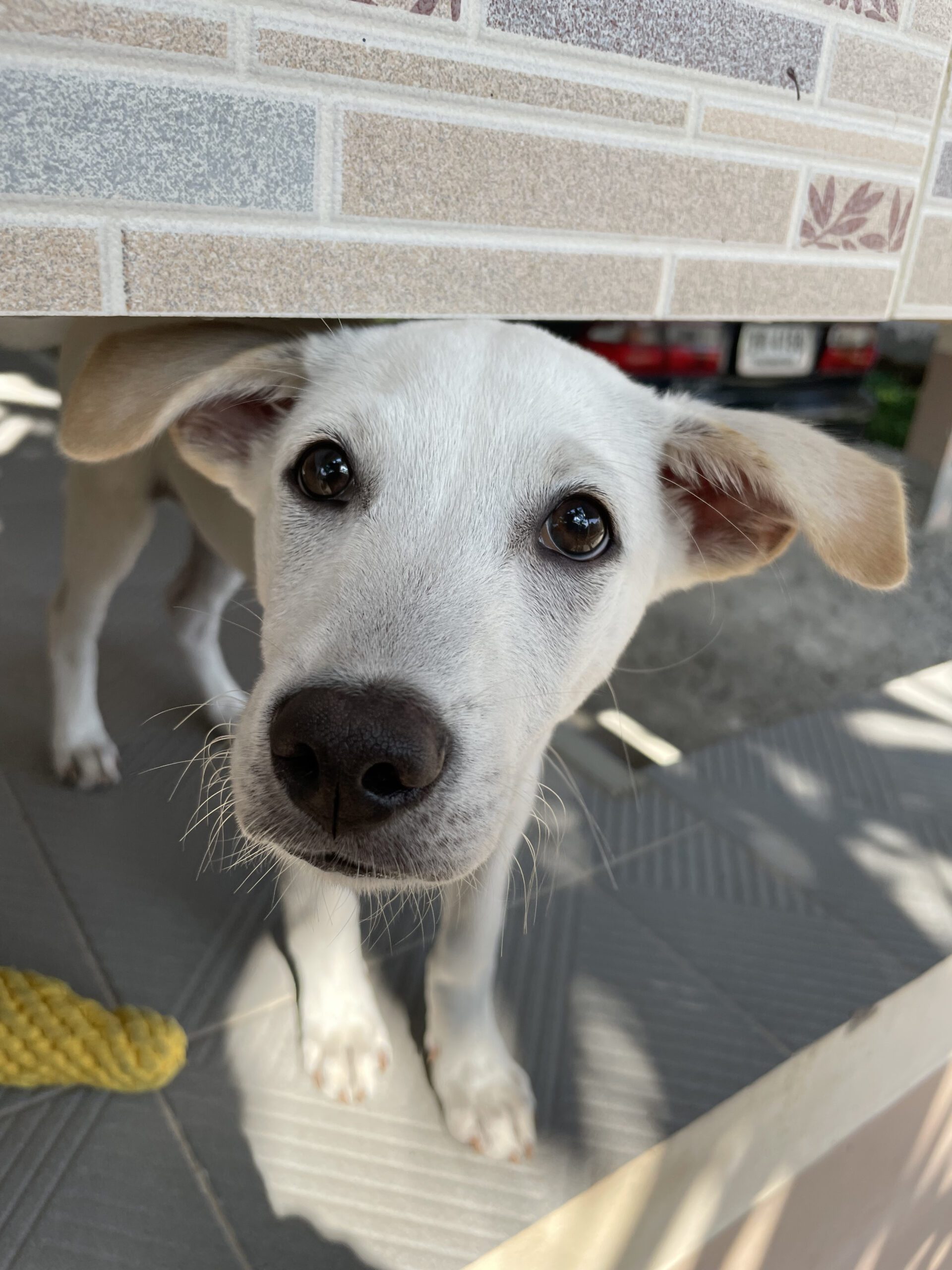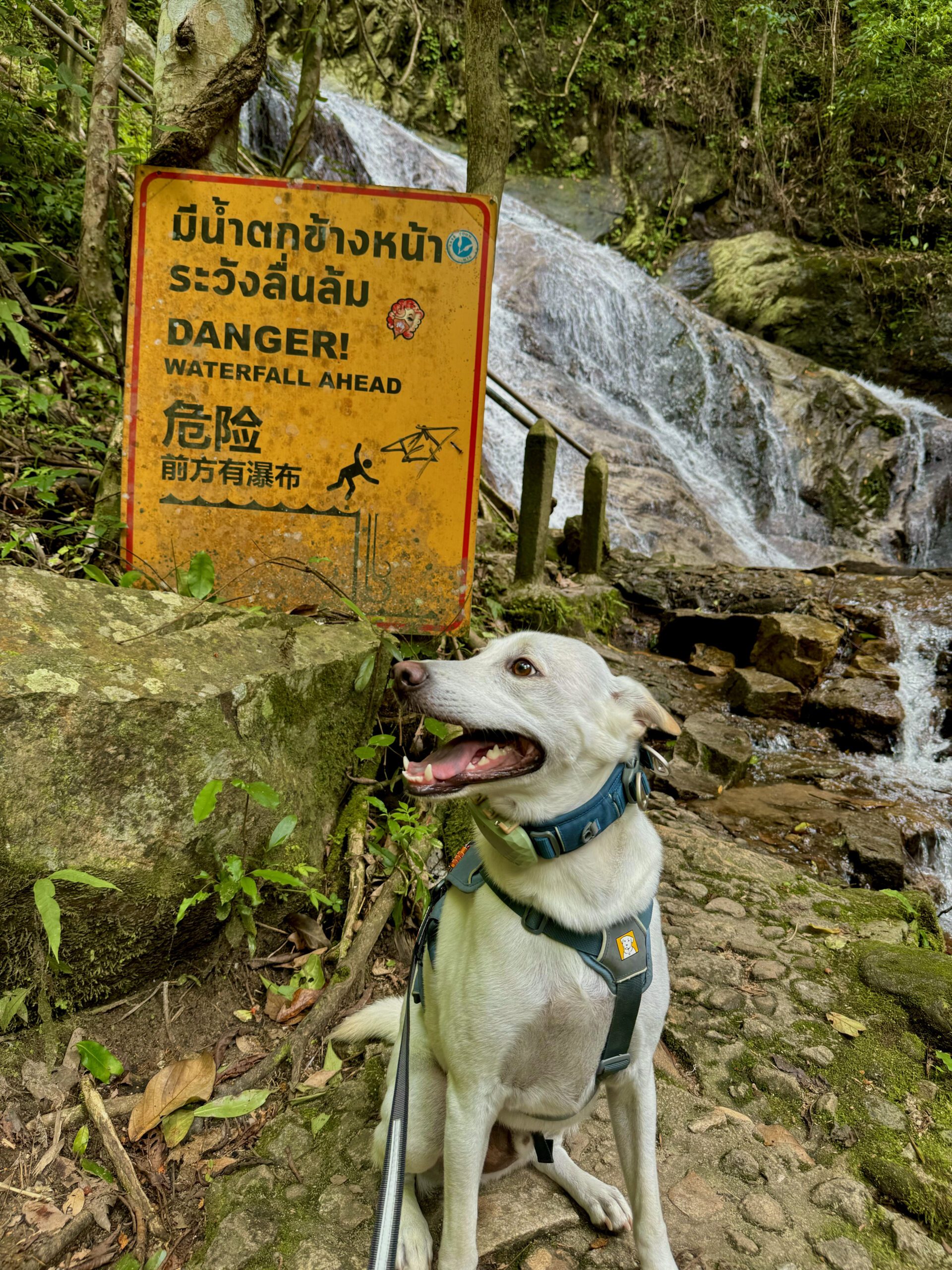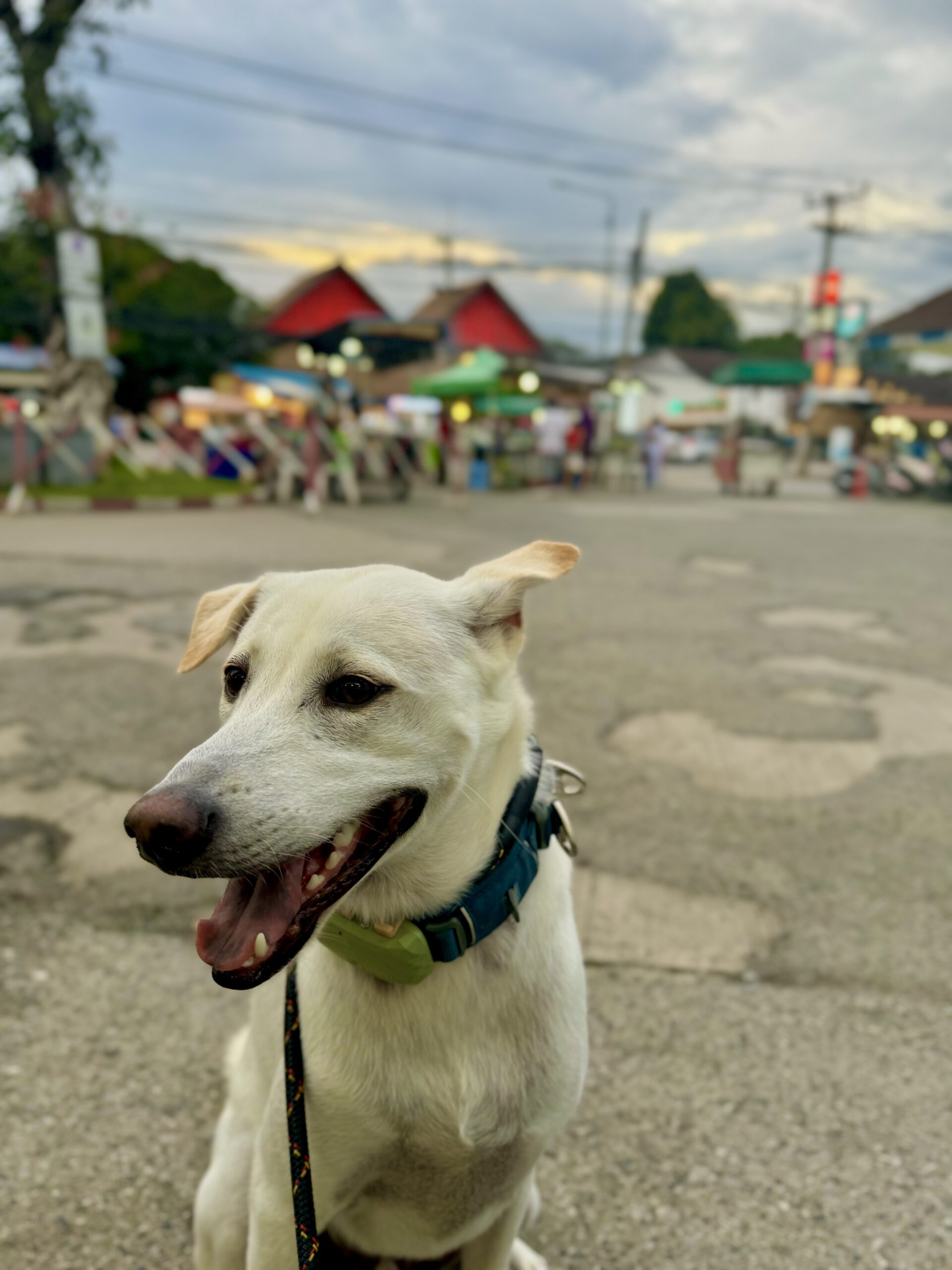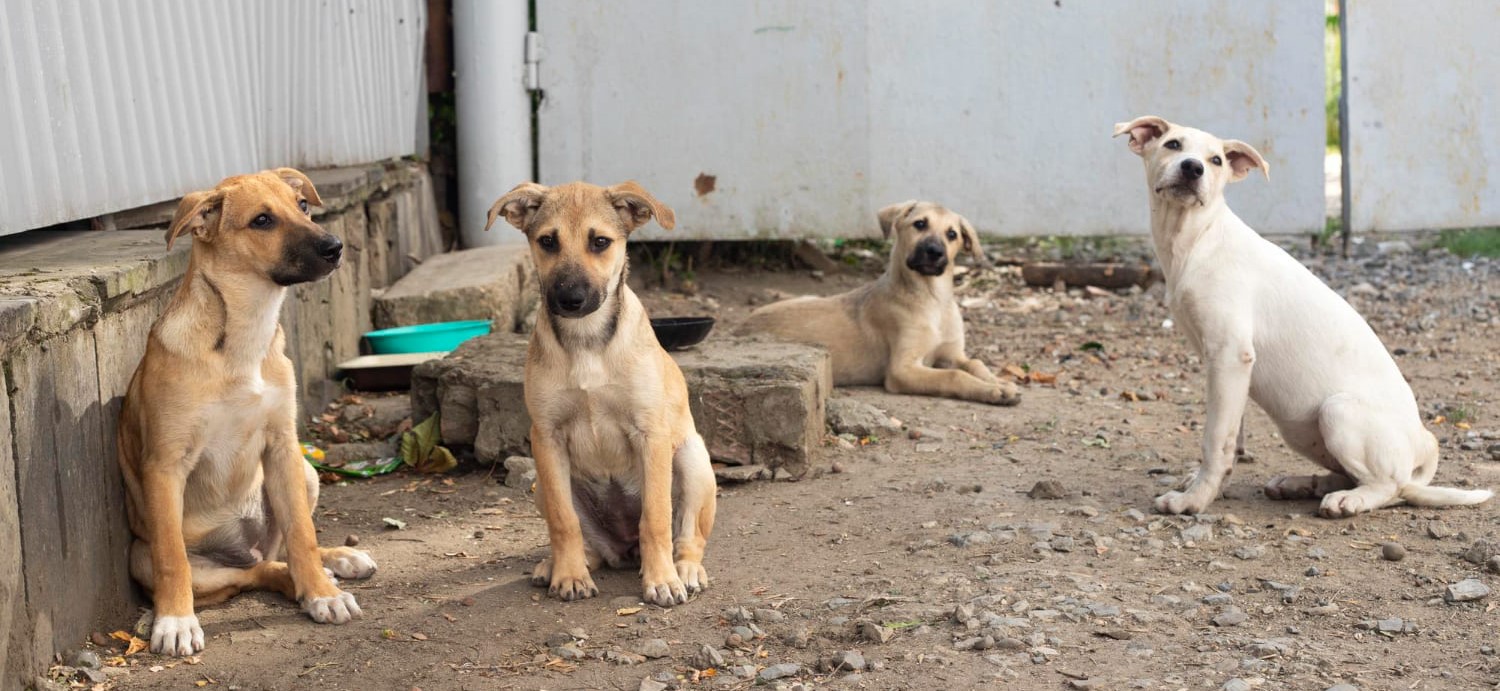

 By Josh Butterworth. Josh is Impact Teaching’s Thailand Program Coordinator, and he lives in Thailand.
By Josh Butterworth. Josh is Impact Teaching’s Thailand Program Coordinator, and he lives in Thailand.
As long as I can remember, I have had cats, hamsters and even chickens. I begged my mum for a dog throughout my childhood, to no avail. Maybe she was aware of the immense responsibility that my immature younger self was not.
Fast forward to 2021, Thailand, and I am teacher in Phetchabun. An adult, just about. After a weekend trip to mountains with our colleagues, some Filipino teachers told us about a female dog who had just given birth in a half built house near their accommodation. My ex-girlfriend couldn’t wait to go and see the puppies, I said it was a bad idea. The rest is history.
 I’m no longer with my ex-girlfriend but have a two and a half year old Thai dog who sleeps in my bed, eats my food and takes me out for several walks each day. We live in Chiang Mai, northern Thailand. He’s the best thing that ever happened to me and I wouldn’t change him for the world, but there are a few things I want you to consider before bringing a beautiful Thai dog into your life.
I’m no longer with my ex-girlfriend but have a two and a half year old Thai dog who sleeps in my bed, eats my food and takes me out for several walks each day. We live in Chiang Mai, northern Thailand. He’s the best thing that ever happened to me and I wouldn’t change him for the world, but there are a few things I want you to consider before bringing a beautiful Thai dog into your life.
Are you in it for the long run?
This may be the most important thing to consider. As I’m sure you already know, the bond a dog creates with their human is unbreakable. My dog, BaoBao, is completely attached to me. As am I to him. Once that bond had been made, I knew he would be by my side for the rest of his life, wherever I go and whatever I do. He’s already travelled more than some humans, all across Thailand, to the Netherlands and the UK. I’ve spent thousands of pounds on him but every penny was worth it to bring him along with me.
If you are considering adopting a dog whilst living in Thailand, you must be willing to take them on whatever adventure you have planned next. Maybe you want to teach in China or head back to your home country for a career away from teaching, if you can’t see a dog by your side then I advise against inviting one into your life in the first place. Just like that famous saying goes, ‘a dog is for life, not just for Christmas’.
But if you are willing to commit and accept the financial aspect of travelling with your dog, it will be one of the best things you ever choose to do. An American colleague of mine adopted BaoBao’s sister, Mali, and we also found homes for the rest of his siblings. This woman left Thailand to live in Cambodia and then Vietnam, before heading home to the US, all with Mali by her side. BaoBao and I relocated to the UK for a year and a half before coming back to Thailand.
The point I am making is that if you are in it for the long run and do commit to having your dog for the rest of it’s life, you are not limited to living in just one country, travel is very possible. Yes, it is expensive and can be a lot of work, but it’s completely worth it to have your companion with you always. If you’re not willing to do this then I strongly advise against getting a dog, creating that deep bond only to be broken when you leave is not fair.
Do you have the time?
As a teacher in Thailand, you will be in school from around 8am until 4pm every weekday. Simply put, that is too long to leave a dog alone at home. But this does not have to be a dealbreaker when you make your decision. I was working those same hours and managed with a young puppy at home, how? Because during my lunch break and free periods I would go home to walk him, feed him and play with him. It is a big commitment, one that you must accept if you want to bring a dog into your life.
But there are many ways around this issue. You yourself could go home to see them, a friend or neighbor might help out, or even a dog sitter if you live in a bigger city such as Chiang Mai or Bangkok. But first, get settled in your new job and see if you think it is a possibility for you.
I now work from home, which is ideal. But if you foresee a future career where you have to be out of the house all day or travel for long periods of time, then you must consider if having a dog is worth it, and if you are willing to put the necessary people in place to care for your dog when you’re away. It’s by no means impossible but could cause stress and effect your work.
If you have the time, or are willing to make it, then having a dog becomes a lot more feasible. If you don’t think you’re able to offer enough hours to your furry friend, then leaving a lonely dog at home is not good for them, or you.
How will it affect your travels?
During a two month holiday, BaoBao and I travelled from Phetchabun in the middle of Thailand to the Koh Lanta in the south. That’s a 3,500km round trip with lots of adventures along the way. But this was only made possible by having a car. In Thailand, busses and trains do not accept dogs. It was an incredible journey and having my best friend next to me enhanced it tenfold. Buying or renting a car makes travelling in Thailand with a dog absolutely doable, but it’s expensive.
Without a car, it’s not impossible but will be a lot more difficult. You would have to get taxis or songthaews long distances at some expense, but it can be done. Generally, Thai people are ok with well-behaved dogs, even more so if they’re young or smaller. You can find hotels that accept dogs and even some boats will allow them on board for all your island adventures.
 However, there are challenges that accompany travelling with a dog in Thailand. The heat, territorial street dogs, finding suitable restaurants and so on. It’s crucial that you are willing to take on these challenges, if you are then you and your dog will have adventures that brings you together and you will remember for the rest of your life.
However, there are challenges that accompany travelling with a dog in Thailand. The heat, territorial street dogs, finding suitable restaurants and so on. It’s crucial that you are willing to take on these challenges, if you are then you and your dog will have adventures that brings you together and you will remember for the rest of your life.
And in touristy areas such as Phuket and Bangkok, you can find many dog hotels. If you need a bit of a break, maybe a beach day and dinner at a nice restaurant, you can check your furry friend in and relax with the peace of mind that they’re in good hands.
Can you afford it?
Paying for everything that a dog needs in Thailand does not break the bank, but it is far from free. Good quality dog food is more expensive than in the West but vet care is a lot cheaper, and I’m yet to find pet insurance. If you are taking a dog from the street then you’re going to need to get all the necessary vaccinations, which can add up but are very important.
If you’re the type of person that does want a dog, my guess is you’re the type of person who wants to treat your dog too. But buying a nice bed, a crate, toys and anything that will enhance your dog’s life can become costly.
Like I have already mentioned, travelling with a dog in Thailand is not as easy as in the UK or other countries. Getting around your local area is challenging without a car, but buying or renting one is expensive. Cars hold their value in Thailand, so an older vehicle you could pick up for £1,200 back home is going to cost almost double in Thailand. Unless you arrive with some savings, it will be difficult to afford a car on a teachers salary. That said, it is possible to walk your dog locally and get taxis, tuk tuks or songthaews if you need to go further afield.
The biggest expense is going to arise when you plan to leave the country with your dog, I’ve done it twice, from Thailand to the UK and back. It probably cost me between £4,000 and £5,000 in total. From buying a suitable travel crate to vaccinations and the hefty airfare, it’s expensive. Factor this in when you deciding whether you can adopt a dog, it’s absolutely possible but you may have to cut your spending, take on extra tutoring or borrow money from family to fund it. I had to do all of those things.
Are you ready for the challenges?
Having a dog in Thailand is very different to having one in the West. Big open green spaces are hard to come by and it’s quite a lot warmer for a start. But the biggest issue I’ve faced is other street dogs. Most are fine, I’d say over 75% are just curious, and may politely ask you to move on with a little growl at worst. Temple dogs are the ones you have to worry about. Never go into a temple with your dog and be cautious when you are passing them. Because they have such a sweet deal with free food and a safe place to live, they are incredible territorial.
 If you are in a couple or have a partner, managing difficult situations with street dogs is a lot easier. One person can move your dog away while the other blocks the aggressors from getting any closer. If you’re scared of dogs or aren’t confident around them, you may have issues walking on your own in Thailand. This is something to consider.
If you are in a couple or have a partner, managing difficult situations with street dogs is a lot easier. One person can move your dog away while the other blocks the aggressors from getting any closer. If you’re scared of dogs or aren’t confident around them, you may have issues walking on your own in Thailand. This is something to consider.
But if you feel capable of taking on this challenge, it is absolutely one that you can overcome. I have grown in confidence and now have no problems with street dogs in my area. Only one in a thousand would ever bite a human, so it’s nothing to be scared of.
Other challenges such as the heat, insects and snakes can arise but are rare. It’s just important that you are willing to face them and learn on the job. That is the only thing you can do, if you accept, then having a dog in Thailand will be a joy.
You will meet so many lovely animals in Thailand, dogs and cats too. Many are in bad shape and living on the street, or in a shelter, if you are an animal lover then you will feel the desire to help all of them. But if you can change the life of just one, you are doing an amazing thing. However, as I hope I have expressed, to commit means a lot. I hope this article has helped you make your decision and if you need any more advice, please email me at josh@impact-teaching.com.
And one last point, I quickly want to speak about something very close to my heart. If you are considering getting a dog, whatever country you may be in, I implore you to adopt rather than buy. There are millions of dogs in need, from the packed shelters across the UK to those roaming the streets of Thailand. Buying a puppy only fuels an industry where female dogs are often treated poorly and used only as baby making machines, discarded when they are no longer profitable. Adopting takes one more dog out of the system or off the streets, and does not support an industry that abuses and monetizes man’s best friend.
Thank you for listening and I hope this has helped!




